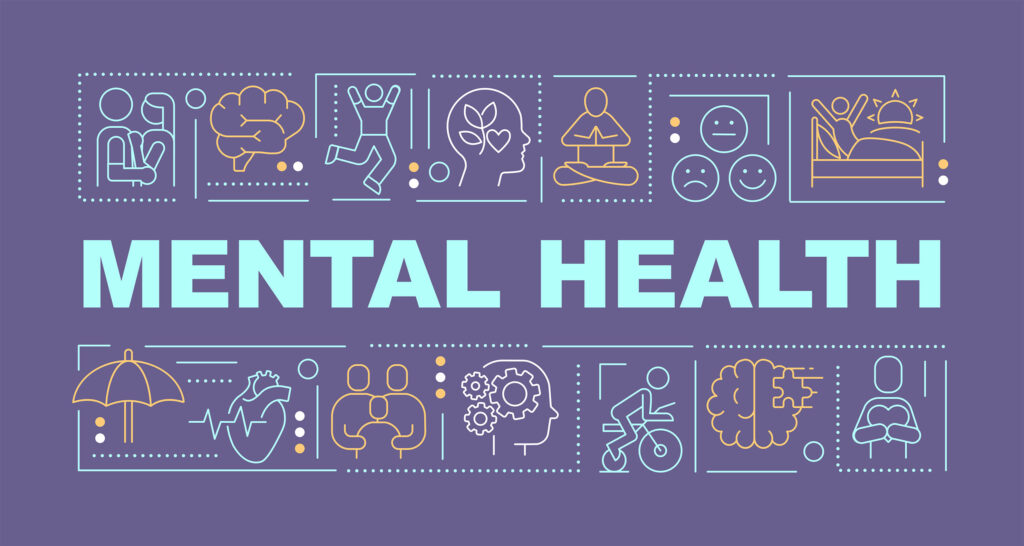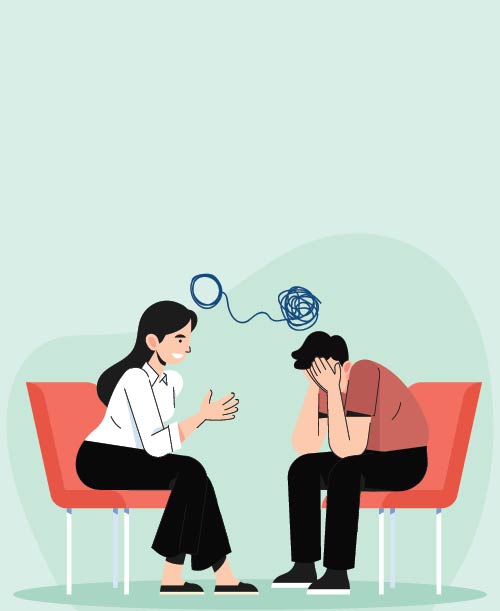The Significance of Mental Health: a Deep Study Therapy, Treatment, and Their Benefits
Psychological wellness substantially forms specific well-being, impacting ideas, emotions, and habits. Therapy and therapy act as necessary avenues for recovery and personal advancement. They use structured assistance, aiding people navigate life's challenges. Yet, many continue to be uninformed of the certain kinds of therapy available and their unique advantages. Recognizing these aspects is necessary for anybody taking into consideration professional psychological wellness assistance. What adheres to might illuminate paths to durability and satisfaction that many forget.
Comprehending Mental Health and Its Effect
Although mental health and wellness is often neglected, it plays a vital duty in general health and day-to-day functioning. It incorporates psychological, emotional, and social factors that affect just how people think, feel, and act. A person's mental health straight impacts their capacity to take care of stress, associate with others, and make options. Poor mental health can result in different concerns, including stress and anxiety, clinical depression, and trouble in preserving partnerships, every one of which can impede personal and professional growth.Furthermore, psychological health has far-ranging implications for physical health. Persistent anxiety and untreated psychological conditions can contribute to numerous physical conditions, such as heart condition and compromised immune responses. Conversely, positive psychological health and wellness promotes durability, making it possible for people to cope with life's difficulties successfully. Understanding psychological health and wellness's relevance is important for promoting helpful settings that advertise emotional well-being, thus enhancing the quality of life for individuals and neighborhoods alike
The Different Kinds Of Counseling and Treatment
In the domain name of mental wellness, various counseling and therapy types satisfy varied requirements. Specific therapy strategies concentrate on individual issues via individually sessions, while group therapy dynamics foster shared experiences and support amongst individuals. Understanding these methods is crucial for selecting the suitable intervention for various difficulties.
Specific Therapy Techniques
Various private counseling strategies exist, each developed to deal with particular mental health and wellness issues and cater to varying client demands. Cognitive Behavior Modification (CBT) concentrates on identifying and changing unfavorable idea patterns, while Psychodynamic Therapy discovers unconscious procedures and previous experiences. Humanistic Therapy highlights personal development and self-actualization, fostering a helpful setting. Interpersonal Therapy (IPT) targets relationship concerns and communication patterns to boost psychological wellness. Furthermore, Approval and Commitment Treatment (ACT) encourages customers to accept their ideas and feelings while devoting to personal worths. Each strategy offers special methods and philosophies, allowing specialists to tailor their techniques to the individual, thereby enhancing the restorative experience and advertising psychological health and wellness healing.
Team Therapy Dynamics
Team therapy dynamics include different restorative approaches that take advantage of the power of common experiences and social connections. This type of therapy commonly includes varied groups, fostering a secure atmosphere for participants to express feelings and ideas. Key types of team treatment consist of support teams, which provide emotional support; process-oriented groups, concentrating on social interactions; and psychoeducational groups, targeted at presenting knowledge regarding mental wellness issues. The characteristics within these groups can enhance self-awareness, as participants commonly review their actions in connection with others. Furthermore, team treatment cultivates a sense of belonging, lowering sensations of isolation. Through shared narratives and cumulative problem-solving, participants can establish dealing approaches and acquire understandings, ultimately adding to private growth and recovery.
The Function of Therapy in Mental Health
Therapy plays a vital role in mental health and wellness by using numerous approaches tailored to specific requirements. These methods offer expert advice that can bring about substantial renovations in emotional well-being. Comprehending the different kinds of therapy can aid individuals make educated choices regarding their psychological health care.

Kinds Of Therapy Approaches
While different therapy approaches exist, each deals unique methods and insights into psychological health therapy - Couples Therapy. Amongst one of the most prominent are cognitive-behavioral therapy (CBT), which concentrates on modifying adverse idea patterns; psychodynamic treatment, which explores subconscious processes and youth experiences; and humanistic strategies, emphasizing individual growth and self-actualization. Additionally, solution-focused short treatment focuses on finding services in the here and now rather than delving into problems. Team therapy fosters community and shared experiences, while family therapy addresses relational characteristics within familial frameworks. Each method deals with various needs, straightening with private preferences, issues, and therapeutic goals. Comprehending these techniques assists clients make informed choices concerning their psychological health trip and advertises efficient treatment tailored to their unique circumstances
Advantages of Specialist Support
Many individuals gain from expert support in handling their psychological health and wellness difficulties. Therapy offers a safe room for customers to explore their ideas and feelings without judgment. This healing environment fosters self-awareness, allowing people to identify patterns in their behavior and create healthier coping methods. Expert guidance also offers official statement accessibility to evidence-based techniques that can reduce signs of stress and anxiety, depression, and various other mental wellness issues. Therapists can aid in establishing sensible goals and offer support in accomplishing them, boosting total well-being. The joint relationship in between therapist and client is essential, as it promotes responsibility and motivates personal growth. Inevitably, specialist guidance plays a vital function in steering mental health trips, bring about improved psychological strength and life fulfillment.
Benefits of Therapy: Recovery and Growth

Just how to Choose the Right Specialist or Counselor
Just how can one navigate the usually overwhelming process of selecting the ideal therapist or counselor? Identifying personal demands is essential; people must consider their particular problems, whether relationship, clinical depression, or stress and anxiety obstacles. It is helpful to study different therapeutic techniques, such as cognitive-behavioral treatment or psychodynamic treatment, to find an appropriate match.Next, potential clients should seek referrals from trusted resources or utilize online directory sites. It is critical to assess therapists' credentials, including their education, licensing, and areas of field of expertise. Setting up first consultations can aid determine compatibility, permitting people to assess interaction designs and individual comfort.Finally, logistical factors, such as area, accessibility, and fees, should additionally be taken into consideration. By thoughtfully evaluating these aspects, one can make an educated choice, eventually promoting a healing partnership that sustains mental health and personal growth.
Conquering Stigma: Accepting Mental Health And Wellness Support
While societal attitudes toward psychological health and wellness have evolved, stigma still offers a substantial barrier for lots of looking for assistance. This preconception often shows up as misconceptions surrounding psychological illness, leading individuals to feel shame or concern regarding their struggles. Lots of individuals think twice to pursue therapy or treatment due to fears about being evaluated or classified. Conquering this preconception is fundamental for promoting an encouraging setting where individuals can freely review their mental health and wellness needs.Communities and organizations play an important role in this transformation by promoting awareness and education and learning concerning mental health issues. Campaigns that highlight personal tales can humanize these experiences, motivating others to seek help without concern. As acceptance grows, individuals may feel extra equipped to embrace mental health and wellness support, recognizing it as a vital aspect of general well-being. By taking down stigma, society can grow a society of understanding, concern, and aggressive psychological healthcare.
Strategies for Preserving Psychological Well-Being Beyond Therapy
Although treatment supplies useful support, keeping mental health outside of sessions is similarly important. People can execute several strategies to sustain their psychological health. Routine physical activity plays a vital function, as exercise promotes the launch of endorphins, which improve state of mind. In addition, a balanced diet abundant in nutrients can considerably affect psychological stability and power levels.Practicing mindfulness and reflection assists individuals manage stress and establish better self-awareness. Developing a regular rest routine is likewise fundamental, as top quality rest is critical for cognitive feature and emotional regulation.Engaging in social tasks cultivates link and minimizes sensations of isolation. Seeking interests or leisure activities can supply an innovative outlet and increase self-esteem. Exercising and setting sensible internet objectives self-compassion permits individuals to cultivate durability. By incorporating these strategies into life, people can successfully support their mental wellness past treatment sessions.
Often Asked Concerns

Just How Can I Tell if I Need Therapy?

Establishing the demand for therapy frequently involves acknowledging consistent sensations of sadness, stress and anxiety, or overwhelming stress. If daily working becomes tough or coping systems fail, seeking specialist support may be a helpful step onward.
What Should I Anticipate in My Initial Therapy Session?
In the very first treatment session, individuals can anticipate an intro, conversation of their factors for seeking assistance, and an overview of the therapist's strategy, creating a foundation for future discussions and establishing convenience in the healing space.
Are Online Therapy Procedure as Effective as In-Person Ones?
Study suggests that online therapy sessions can be as efficient as in-person ones. Factors such as the therapist's qualifications, client interaction, and the therapeutic relationship substantially affect results, no matter the medium utilized.
Can Treatment Assist With Connection Concerns?
Treatment can help individuals in attending to relationship issues by providing devices for interaction, comprehending feelings, and resolving conflicts. Cognitive Behavioural Therapy. It promotes much healthier characteristics and encourages personal development, inevitably fostering stronger, much more satisfying links between partners
Just How Lengthy Does Therapy Normally Last?
Treatment duration differs considerably based upon specific requirements and goals. Normally, sessions may last from a couple of weeks to several months, with some people participating in ongoing treatment to resolve long-term worries and individual growth. Cognitive Behavioral Treatment (CBT) focuses on identifying and transforming more tips here unfavorable thought patterns, while Psychodynamic Therapy explores subconscious processes and past experiences. Trick types of group therapy consist of assistance teams, which supply psychological assistance; process-oriented groups, focusing on social interactions; and psychoeducational groups, intended at presenting expertise regarding psychological wellness issues. Amongst the most prominent are cognitive-behavioral therapy (CBT), which concentrates on altering adverse thought patterns; psychodynamic treatment, which discovers unconscious processes and childhood experiences; and humanistic strategies, highlighting individual growth and self-actualization. Group therapy promotes neighborhood and shared experiences, while family treatment addresses relational dynamics within familial structures. It is beneficial to research study various healing methods, such as cognitive-behavioral therapy or psychodynamic therapy, to find an appropriate match.Next, potential customers need to look for referrals from relied on resources or make use of online directory sites.